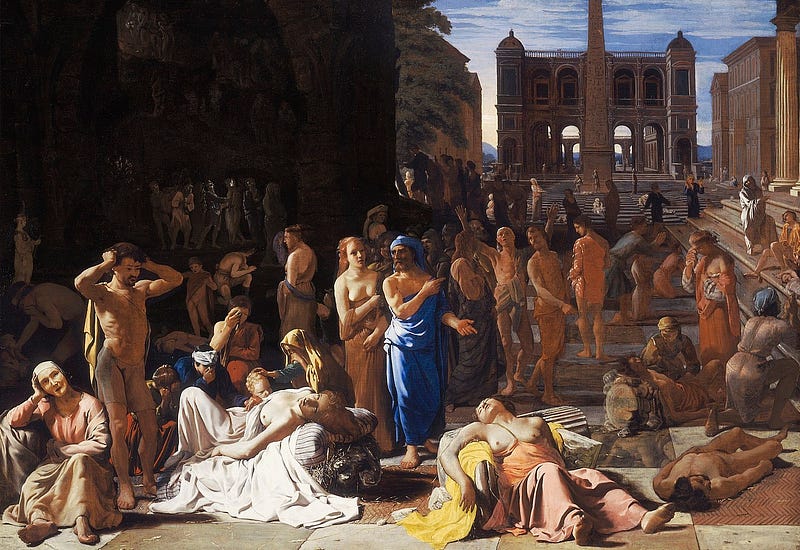The Plague of Athens: A Historical Catastrophe and Its Impact
Written on
Chapter 1: The Plague Unleashed
The Plague of Athens, which claimed the lives of over 250,000 individuals in 430 BCE, serves as a stark reminder of the vulnerabilities of human life against infectious diseases. The Greek terms "epidemic" and "pandemic" have become commonplace in our discussions, especially in the wake of the recent coronavirus outbreak. This situation forces us to confront the fragility of life when faced with such perilous illnesses.
Yet, this was not the first time humanity faced a significant plague. Many ancient civilizations, including the Greeks, have endured and adapted to the emergence of such epidemics throughout history.
In 430 BCE, Athens, flourishing under the guidance of Pericles, was struck by a mysterious epidemic that led to what we now refer to as the "Plague of Athens." This catastrophic event resulted in the deaths of nearly one-third of the Athenian population. The ramifications of this deadly plague significantly contributed to Athens's eventual defeat by the Spartans in 404 BCE. To this day, the origins of the plague remain a topic of debate among epidemiologists.
In this discussion, we will delve into the circumstances surrounding this tragedy, its aftereffects, and the ways it reshaped history.
Crisis and Origins
In the year 430 BCE, Athens was basking in its "Golden Age," a period characterized by remarkable achievements and high living standards. However, this supremacy in the Mediterranean was precarious, as Athens was embroiled in a civil conflict with Sparta, known as the "Peloponnesian War." This conflict set the stage for the subsequent outbreak of disease.
The plague's onset occurred during the summer of 430 BCE, with a second wave emerging in the summer of 428 BCE. The outbreak was catastrophic, resulting in the death of approximately 250,000 to 300,000 people, including notable figures such as the esteemed general Pericles and his family. The disease spread throughout Greece and the eastern Mediterranean, eventually tapering off in the winter of 426 BCE.
Thucydides, a Greek historian, documented this calamity in his account of the "Peloponnesian War." He himself contracted the plague but survived, providing invaluable insights into the initial stages of the epidemic. Thucydides proposed that the disease likely originated in sub-Saharan Africa, traveling north through Egypt and Libya before reaching Greece via the port of Piraeus.
Symptoms and Consequences
Thucydides meticulously detailed the symptoms experienced by the afflicted, which included high fever, intense thirst, skin pustules, stomach ulcers, and severe diarrhea leading to death. Many victims experienced insomnia and persistent agitation.
Most individuals succumbed to the illness within 7 to 9 days following the onset of symptoms. Survivors often faced lasting effects, such as blindness, memory impairment, and physical disfigurement.
Despite numerous medical attempts to treat the illness, no effective remedies were found. The mortality rate among physicians was alarmingly high, indicating the contagious nature of the disease. At that time, there were no basic forms of personal protective equipment to safeguard healthcare workers.
The Plague of Athens fundamentally transformed the social and political landscape of Athenian society. The death of many wealthy individuals shifted the balance of power, as their fortunes were inherited by less affluent relatives. Additionally, the plague had a profound effect on social behaviors; many people disregarded laws and moral codes, believing they had little time left to concern themselves with reputation.
These changes significantly contributed to Athens's decline in power and ability to progress, leading to its eventual defeat by Sparta and a diminished status in ancient Greece.
Hypothesized Causes
To this day, the scientific cause of the plague remains elusive. Scholars worldwide have put forth various theories based on Thucydides's descriptions, yet no consensus has been reached regarding the pathogen responsible for the outbreak.
J.F.D. Shrewsbury's work, “Plague of Athens,” identifies the illness as unique to the city and cites attempts from the 1940s to identify its nature. Scholars have speculated that the disease could have been typhus, typhoid, bubonic plague, or smallpox, or possibly a combination of these.
Shrewsbury dismissed smallpox and typhus due to insufficient evidence. Bubonic plague was also ruled out later. Ultimately, the "Pneumonic Plague," which caused significant fatalities in Manchuria, was proposed as the leading cause, though skepticism remains since Thucydides did not mention key symptoms like coughing or blood spitting.
The true nature of the Plague of Athens may forever remain a mystery. What is certain is its profound impact on the course of history, much like the ongoing pandemic we face today.

Chapter 2: Historical Reflections on the Plague
This video titled "The Plague of Athens - Past Pandemics" offers an insightful overview of the epidemic's historical context and its implications.
In this video, "Pandemics in History: The Plague of Athens," we explore the broader significance of this event in the annals of historical pandemics.